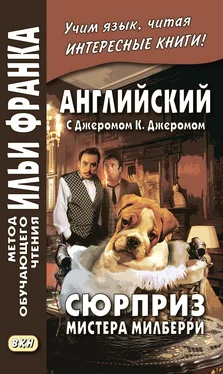linen-basket["lɪnɪn'bɑ:skɪt] , touch[tʌʧ] , knuckles['nʌk(ǝ)lz] , knocked[nɒkt] , balustrade['bælǝ'streɪd] , nervous['nɜ:vǝs] , excited[ɪk'saɪtɪd]
He came by the 'bus that meets the 4.52. He'd a handbag and a sort of hamper: it looked to me like a linen-basket. He wouldn't let the Boots touch the hamper, but carried it up into his bedroom himself. He carried it in front of him by the handles, and grazed his knuckles at every second step. He slipped going round the bend of the stairs, and knocked his head a rattling good thump against the balustrade; but he never let go that hamper – only swore and plunged on. I could see he was nervous and excited, but one gets used to nervous and excited people in hotels.
Whether a man's running away from a thing(убегает ли человек от чего-либо; to run – бегать, бежать; убегать; thing – вещь, предмет; нечто, что-то ) , or running after a thing(или же гонится за чем-то) , he stops at a hotel on his way(он останавливается в гостинице на своем пути; way – путь, дорога ) ; and so long as he looks as if he could pay his bill(и если он выглядит так, будто может заплатить по счету; so long as – /до тех пор/ пока; поскольку, если только ) one doesn't trouble much about him(о нем много не беспокоишься = на него не обращаешь особого внимания; to trouble – тревожить/ся/, беспокоить/ся/; trouble – тревога, волнение, беспокойство ) . But this man interested me(но этот человек заинтересовал меня) : he was so uncommonly young and innocent-looking(он был столь необыкновенно молод и простодушен на вид; innocent – невинный; наивный, простодушный ) . Besides, it was a dull hole of a place after the sort of jobs I'd been used to(кроме того, это место было скучной дырой после тех /видов/ работ, к которым я привык; dull – тупой, глупый; скучный, унылый; hole – дыра; отверстие; захолустье; place – место; город, местечко; job – работа; место работы, должность ) ; and when you've been doing nothing for three months(а когда вы ничего не делали три месяца) but waiting on commercial gents as are having an exceptionally bad season(а только обслуживали коммерсантов: «торговых джентльменов», у которых исключительно плохой сезон; to wait on smb. – прислуживать, служить кому-л.; commercial – торговый, коммерческий; gent = gentleman; to except – исключать; season – время года; сезон, период ) , and spoony couples with guide-books(и влюбленные парочки с путеводителями; spoony – /разг./ влюбленный без ума; to spoon – /разг./ обниматься, миловаться /о влюбленных/; ворковать; guide – проводник, гид; путеводитель; руководство; book – книга ) , you get a bit depressed(вы немного приунываете; to get – доставать, получать; приходить в какое-л. положение, состояние; bit – кусочек; небольшое количество; to depress – подавлять, угнетать; приводить в уныние ) , and welcome any incident, however slight(и рады любому событию, каким бы незначительным /оно ни было/; to welcome – приветствовать /гостя/; радушно принимать; incident – случай, событие, происшествие; slight – тонкий, худощавый; легкий, незначительный ) , that promises to be out of the common(которое обещает быть незаурядным; common – общий; обычный, заурядный ).
hotel [hǝʋ'tel] , doesn't ['dʌznt] , innocent ['ɪnǝs(ǝ)nt] , commercial [kǝ'mɜ:ʃ(ǝ)l] , exceptionally [ɪk'sepʃ(ǝ)n(ǝ)lɪ] , guide [ɡaɪd] , incident ['ɪnsɪd(ǝ)nt]
Whether a man's running away from a thing, or running after a thing, he stops at a hotel on his way; and so long as he looks as if he could pay his bill one doesn't trouble much about him. But this man interested me: he was so uncommonly young and innocent-looking. Besides, it was a dull hole of a place after the sort of jobs I'd been used to; and when you've been doing nothing for three months but waiting on commercial gents as are having an exceptionally bad season, and spoony couples with guide-books, you get a bit depressed, and welcome any incident, however slight, that promises to be out of the common.
I followed him up into his room(я последовал за ним в его номер) , and asked him if I could do anything for him(и спросил, могу ли я что-нибудь сделать для него) . He flopped the hamper on the bed with a sigh of relief(он плюхнул корзину на кровать со вздохом облегчения; to flop – /разг./ шлепнуться, плюхнуться; бить /крыльями/; швырнуть ) , took off his hat(снял шляпу; to take off ) , wiped his head with his handkerchief(вытер голову платком) , and then turned to answer me(и затем обернулся, чтобы ответить мне; to turn – поворачивать/ся/ ).
“Are you a married man?” says he(вы женаты: «женатый мужчина»? – говорит он).
It was an odd question to put to a waiter(было странно такой вопрос задавать официанту; odd – нечетный; странный, необычный; to put – класть, ставить; задавать /вопрос/ ) , but coming from a gent there was nothing to be alarmed about(но так как он исходил от джентльмена, тревожиться было не о чем; to alarm – поднять тревогу, дать сигнал тревоги; встревожить; alarm – тревога, сигнал опасности ).
“Well, not exactly(ну, не совсем; exactly – точно; именно, как раз; да, совершенно верно /выражение согласия/; exact – точный; верный ) ,” I says – I was only engaged at that time(я был только помолвлен в то время; to engage – нанимать на работу; брать на себя обязательство; обручаться ) , and that not to my wife, if you understand what I mean(и не с моей женой, если вы понимаете, что я имею в виду) – “but I know a good deal about it(но я многое знаю об этом; a good deal – значительное количество, очень много; много, изрядно; deal – некоторое количество ) ,” I says, “and if it's a matter of advice(и если это дело совета = если вам нужен совет…) —”
Читать дальше











